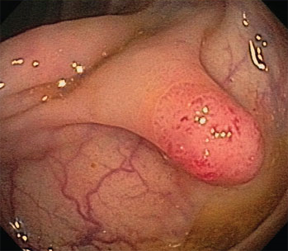Fecal Occult Blood Screening in Colorectal Cancer Offers Promising Results
Two French studies have shown that screening for colorectal cancer with fecal occult blood tests can be very effective, according to results presented at the ESMO 2014 Congress.
The head of this pedunculated polyp is erythematous and consists of adenomatous tissue.

Two French studies have shown that screening for colorectal cancer (CRC) with fecal occult blood tests (FOBT) can be very effective. In one, FOBT screening increased the rate of diagnosis of high-risk precancerous adenomas (polyps) by 89%, and in the other, using FOBT to guide colonoscopy decisions could increase positive predictive value.
In the first trial, researchers led by Vanessa Cottet, MD, of INSERM Unité 866 in Dijon, France, analyzed data from a registry of individuals in the Côte-d’Or region; the study included patients between the ages of 50 and 74 who had a first adenoma identified between January 1997 and December 2008 (4,908 men, 3,133 women). Of those, 38.7% of patients had a high-risk adenoma based on various characteristics.
The age-standardized diagnosis rate for high-risk adenomas before a biennial FOBT screening program was implemented was 136 per 100,000 people. After implementation, the rate was 257 per 100,000 people, for an increase of 89%. Non-advanced adenoma diagnosis also increased, from 235 to 392 per 100,000 people (68%).
“Given the superior performance of immunochemical tests [over guaiac tests], it is reasonable to assume that an organized screening program using such tests would lead to a greater reduction of colorectal cancer death and probably to a reduction in colorectal cancer incidence,” Cottet said in a press release.
In the other trial, Sylvain Manfredi, of CHU Pontchaillou in Rennes, France, studied 1,179 patients in five consecutive CRC screening campaigns. They compared the value of colonoscopy in patients deemed to be at high risk for CRC based on family history to the value in patients deemed to be at average risk based on an FOBT test.
The study found that the positive predictive value of colonoscopy in those high-risk patients based on history was 3.9% for cancer, 12.9% for advanced adenoma, and 25% for any adenoma. By comparison, in the average risk population selected by a positive FOBT, the positive predictive value of colonoscopy ranges from 7.5% to 10% for cancer, from 15% to 27% for advanced adenoma, and from 32% to 37% for any adenoma.
“The take-home message is that the positive predictive value for colorectal neoplasia in high-risk patients screened by colonoscopy is lower than it is for average risk patients screened by FOBT,” Manfredi said. “As a result, we believe this population may benefit from fecal occult blood or immunochemical blood testing to select the best candidates for colonoscopy.”
The discussant for the session, Hans-Joachim Schmoll, MD, PhD, of Martin Luther University in Germany, confirmed that these results suggest the use of FOBT followed by colonoscopy if the FOBT is positive rather than colonoscopy first. “However, if colonoscopy is restricted only to those patients who have positive FOBT, there is a high chance that adenoma or even cancer can be not identified,” he said. “The data support the use of both options as part of a large national screening program with is adapted to several different groups, to optimize the outcome and increase the rate of cure.”